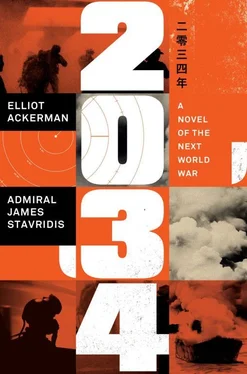
07:14 July 30, 2034 (GMT-4)
Washington, D.C.
No one could get in touch with Major Mitchell. Admiral Hunt’s decision to strip the Hornets of any overridable communications system had left the aircraft without any functioning communications at all. Without too much trouble, the Indians had jammed the low-tech UHF/VHF/HF receivers the aircraft relied on. From the White House Situation Room to the combat information center on the Enterprise , the only sound was Quint as he continued to call out to the flight of nine aircraft, his voice echoing across the video teleconference. In the Oval Office, a separate conversation was in process: the president requesting that her counterpart, the Indian prime minister, recall his fleet.
The prime minister obfuscated. Was Madam President certain the aircraft that engaged her were Indian? The prime minister would, of course, need to confirm this with his defense minister and his armed forces chief of staff before recalling any of his assets. And what was the mission of these aircraft that had allegedly come under fire from the Indian fleet? Could Madam President kindly pass along the exact location of this flight of nine planes? Nearly a dozen staffers—from CIA, NSA, the State Department, and Pentagon—listened on the line, furiously jotting down their notes on the prime minister’s obvious stonewalling.
That was also the word Wisecarver used when he stepped back into the Situation Room from the Oval Office. On hearing this, Chowdhury exited into the hallway and pulled out his phone. There was only one other thing he could think to do.
Patel answered on the first ring. “Quite a corner we’ve painted ourselves into,” he said, without waiting for his nephew to speak.
“You need to call off your aircraft,” answered Chowdhury. He had cupped his hand over the receiver, concerned that he might be overheard. “Switch off your jammers so we can talk to our pilots.”
“ Pilot ,” corrected his uncle. “Our interceptors report that only one of them escaped. Two of our aircraft are giving chase.”
“Recall your interceptors,” pleaded Chowdhury. “Let us get in touch with our pilot to abort his mission.” Even as he said this, Chowdhury wasn’t certain it was possible. Would they be able to contact the pilot? Was he even listening?
The line went silent. Chowdhury glanced up and noticed Wisecarver standing in the doorway of the Situation Room, watching him.
“Too risky,” answered Patel. “If we call off our interceptors, how can we be certain that the pilot won’t strike Shanghai?”
Chowdhury glanced once more at Wisecarver, who’d taken a menacing step in his direction. “We’ll abort the strike; you have my word. The president will—”
Wisecarver slapped the phone from his grip. In the time it had taken Chowdhury to utter his first sentence and then half of his second, Wisecarver had covered the distance between them. “You don’t speak for the president,” Wisecarver snapped, planting the heel of his shoe on the phone, so that when Chowdhury reached after it, he appeared as though he were groveling at Wisecarver’s feet, which in a way he was.
“Please,” said Chowdhury. “You’ve got to give us a chance to call it off.”
“Not after Galveston,” he answered, shaking his head. “Not after San Diego. Do you think this administration or this country will tolerate”—for a moment he struggled for the appropriate word, and then found it, plucking it like fruit from a branch—“ appeasement. ”
Chowdhury remained on his knees, his hands still reaching pathetically for his phone as he glanced up at Wisecarver, who, with a halogen bulb from the ceiling framing his head, seemed to glow strangely, like a vengeful saint. “There’s only one pilot left,” Chowdhury said weakly. “What are the chances he’ll even make it to his target? If we call the Indians off, we could save him… we could stop all of this.”
Wisecarver reached down toward his foot. He picked up Chowdhury’s phone and tucked it into his own coat pocket. Then he offered Chowdhury a hand, hoisting him up from the floor. “C’mon,” said Wisecarver. “On your feet. No need to stay down there.” The two stood next to one another in the empty corridor, sharing a quiet second as if to diffuse the tension between them. Then Wisecarver glanced up toward the lights that had framed his head a moment before. “There’s a quote from the Bible,” he began, “or maybe it’s the Talmud or Qur’an? I can never remember which. But it’s one I’ve always appreciated. It goes, Whosoever destroys one life has destroyed the world entire, and whosoever saves a single life is considered to have saved the whole world…. Or at least I think that’s how it goes. Tell me, Sandy, are you a religious man?”
Sandeep shook his head, no.
“Me neither,” said Wisecarver. He walked off with Chowdhury’s phone.

19:19 July 30, 2034 (GMT+8)
Shanghai
At first the shore was just a smudge on the horizon. Then the contours of the skyline formed. At one mile out, Wedge would begin his ascent, climbing to his attack altitude. Everything would depend on altitude and time. He needed to take on at least ten thousand feet so that when he activated and then dropped his payload it would have sufficient time to arm. He needed to do this quickly so that the antiaircraft systems that lurked below couldn’t find their mark. As he approached the city, his thought pattern was simple, almost primordial: Here it comes, here it comes, here it comes, each breath seemed to say.
At five miles out he could see traffic on the roads.
At three miles he could see the waves breaking on the beach.
At two miles the individual windows in the skyscrapers winked at him as they caught the sun—
Then he rocketed his stick, hard back.
The Gs pressed on his chest like an enormous hand. Pinpricks of light did their familiar Tinker Bell dance in his vision. Had anyone been listening, they would’ve heard his grunts, which were like a tennis player hitting from the baseline. A long stream of tracer fire arched toward him from the shore as he careened above Shanghai. Wedge rolled his plane belly skyward. With his cockpit hung toward the ground, he glimpsed two wispy missile launches, whirling upward toward his head. He deployed the last of his chaff and flares, dumping the white-hot magnesium beneath him and hoping it would be enough to confuse the missiles.
His altimeter orbited past three thousand feet.
Behind him, the pair of Indian Sukhois now appeared. He’d flown low enough and fast enough that they couldn’t have tracked him. They must’ve figured he was heading here.
His altimeter passed four thousand feet.
The Chinese systems didn’t distinguish between him and the Indian pilots. All three of them corkscrewed and juked through the antiaircraft fire that chewed up the sky while their engines, with a dismal rumble, forced them ever higher. Wedge struggled to reach his drop altitude of ten thousand feet while the Sukhois kept up the pressure, slotting into position on his tail. Any second they’d take their shot. Wedge knew he needed to deal with the Sukhois if he was ever going to get up to altitude.
He barreled right.
We’ll decide it here, he thought, at five thousand feet.
Beneath the three aircraft, the city was lit up, spitting tracers in every direction. When Wedge had barreled right, the Sukhois had barreled left. The two sets of aircraft traveled in opposite directions along the circumference of a shared circle whose miles-long diameter was nearly the size of Shanghai itself. Wedge couldn’t help but admire the Indian pilots, who had made an astute tactical move. By giving up their position on his tail they’d each be able to make a head-on pass, leveraging their two-to-one advantage.
Читать дальше













